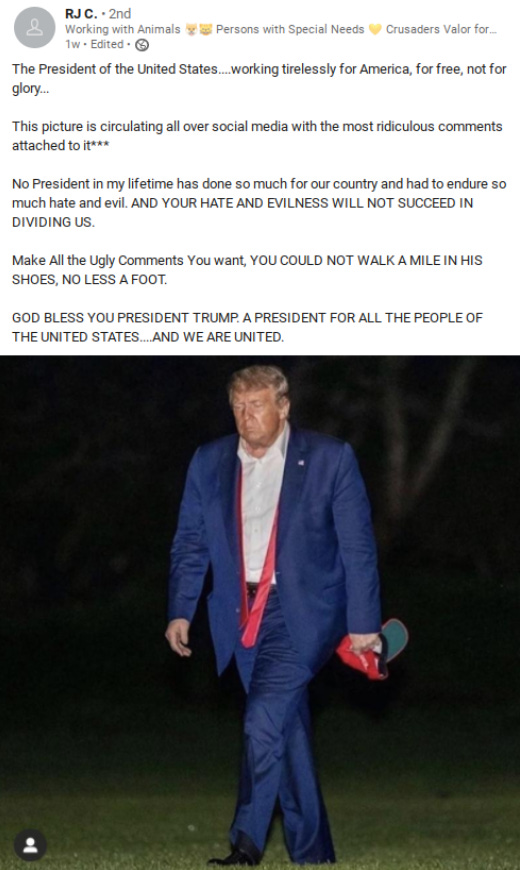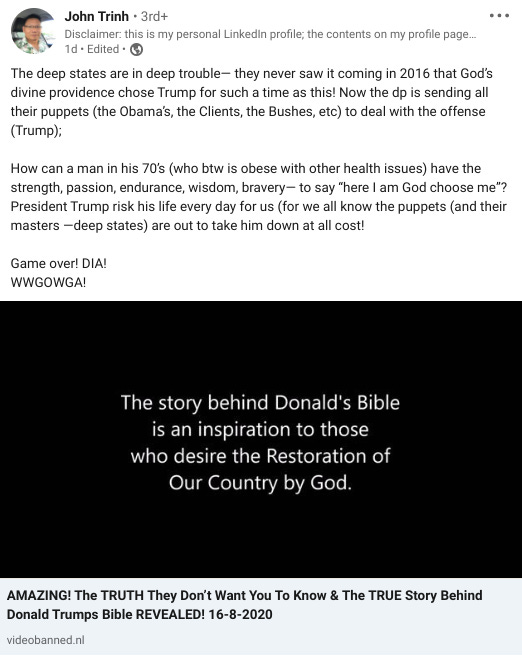Is LinkedIn Ready for the Age of Disinformation?
Users say they're also getting censored
Apologies for not putting out an edition yesterday. I wound up biting off more than I could chew and figured I’d rather not send anything than send a filler edition to clog your inbox. Hopefully it was worth the wait. We’ll see.
*************************************************************************************************************
(Ima

(Image via Al Drogo/New York Times)
Over the last two years, the platforms have been jockeying for pole position in the “Praise us, we did something that was good and smart” race.
Axios’s Sara Fischer has a great rundown of what the platforms have been doing since 2018 with political ads in order to prepare for the spread of disinformation in the run-up to both the 2018 midterm election and the 2020 general election.
After the 2016 election, it became clear that Big Tech was not prepared to protect its platforms from being abused to manipulate voters and spread misinformation, including through advertising.
And:
After 2016, foreign interference was seen as the biggest problem platforms face with political information and ads. Now much of the worry is about American politicians spreading misinformation. Banning political ads is one way to limit both kinds of problems.
So Google sent up a trial balloon in June 2018, banning political ads in Washington state. LinkedIn that same month followed suit. But instead of approaching it in a ham-fisted way, it went the whole hog and outright banned political ads. And that’s the last we hear of LinkedIn on the political ads front. Because if you make the right call early, you don’t have to do incremental changes to eventually get there.
This week, Facebook made two (again, good and smart) decisions: choke off all QAnon content and, after polls close on Nov. 3, suspend political and social issue ads.
But like cockroaches scattering across the kitchen when you turn on the lights, adherents of QAnon are finding different platforms to spread their stupid conspiracy theories of how Donald Trump is the only one who can stop the cabal of satan-worshiping pedophile Democrats supposedly running the country.
One platform they’re trying to infest: LinkedIn.
“They’re going to use everything they possibly can at their disposal and go wherever people spend time,” said Matt Rivitz, co-founder of Sleeping Giants. “I guarantee you LinkedIn is not prepared for this. They haven’t had to deal with this.”
Typically, people use LinkedIn much differently than they use Facebook or Twitter. It’s a professional space where folks connect with industry people, do some old fashioned networking in a newfangled environment. Users aren’t there to share photos of their grand-kids.
And since not only is your actual name attached to your profile, but also your work, people are typically more well-behaved. Why would a person post on LinkedIn racist, homophobic, sexist, misogynistic, anti-Semitic content when their employer or future employer can see it?
But recently, perhaps reflecting the swirling shitstorm we all live in, in conjunction with how other platforms are now tackling bad behavior on their own sites, LinkedIn is morphing into an extension of the broader social media universe. Content you’d typically find on Facebook or Twitter is now slipping into the LinkedIn stream.


Earlier this week, the Wall Street Journal reported that there has been an “uptick” in QAnon activity on the platform in recent months.
The most striking thing about that WSJ piece is that it softens if not normalizes the QAnon conspiracy. One example:
David Gardner, a 33-year-old engineer for an auto-industry company in Buffalo, N.Y., said he added “WWG1WGA” to his profile several weeks ago. His recent posts are about the auto industry. But on LinkedIn’s internal messenger, he mixes professional chatter and QAnon talk with his professional connections who revealed that they also support the movement.
“We’re talking about professional things, and if a Q Drop comes out,” Mr. Gardner said, referring to a new post by Q, “they come in and send me the link.” He considers himself a moderate QAnon supporter. “Are the elites eating children? No,” he said. But “if there was evidence, then OK.”
A search on LinkedIn for WWGOWGA yields content like this:

The platforms have to battle disinformation from the home-front in QAnon and from foreign actors. It is a never-ending game of Whack-A-Mole.
Bob James, a retired marketing and PR professional, got temporarily banned on LinkedIn this week when he jumped into a pro-Trump conversation. He says there were some “nasty” comments happening, and he responded snarkily, in kind.
“But I was doing it for a reason,” he told me. “I wanted to see what would happen. And sure enough, I got an email from LinkedIn saying we’ll take your content down. My comments were being suppressed, but the right wingers weren’t.”
James told me that he’s not a heavy LinkedIn user, but does comment on posts. He’s retired, so it’s not like he needs the job connection functionality of the platform. He said that last Sunday morning, he saw several posts from connections in the UK who were saying that some of their favorite posters had disappeared from the site. Conversations of censorship have been popping up more frequently on the Microsoft-owned platform.
(The New York Times reported yesterday that many Black users are finding that their comments and posts are being censored by LinkedIn.
The NYT writes: “Nicole Leverich, a LinkedIn spokeswoman, wrote in an email: ‘We are not censoring content and have not made any changes to our algorithm to reduce the distribution of content about these important topics.’ She added in an interview that LinkedIn was introducing a new process for notifying users when their posts were flagged for violating platform rules, and that some people hadn’t been phased in by the end of September.”)
James and his connections started talking to one another trying to figure out what was happening. They landed on the idea that perhaps folks were banned for “going too far in criticizing Boris Johnson.”
In an email, Anna Beyder, a LinkedIn spokesperson told me:
With respect to our members’ privacy, we don’t comment on specific member actions, but we have clear and consistent Terms of Service and Professional Community Policies that apply equally to all of our members. We’re constantly working to ensure every LinkedIn member has a safe, trusted, and professional experience on our platform.
Just a few hours later, on Sunday afternoon, James noticed many pro-Trump postings in his feed. Ones with big hero images. So he engages and sees that these postings are coming from the Tennessee Tea Party and the Nashville Tea Party, a group James says was a Russian-backed alias during the 2016 election. He also believes this disinformation is coming from the Kremlin.
I have not found any evidence of either claim; that the TTP was a Russian-backed alias or that this specific disinformation is coming from the Kremlin.
However.

“[Russia is] doing it again and brought it to LinkedIn,” James said. “I tried to stop it. I don’t want this in my stream. It’s resembling something like Facebook and Twitter now. I think [LinkedIn] just doesn’t know.”
James got suspended, but after 48 hours and uploading his driver’s license to confirm that he is a human being who lives in the United States, he got his account back.
After I reached out to LinkedIn about the Tennessee Tea Party’s page, the company took down the page, and that of the Nashville Tea Party. Beyder told me in an email
“We have restricted the Tennessee Tea Party for derogatory content and misinformation. We apply a variety of automated technologies, combined with a trained team of reviewers and member reporting, to keep our members safe from all types of misleading content and bad actors. We enforce our policies, which are very clear: misinformation or any other activity intended to mislead or lie to our members is a violation of our terms of service.”
The Wall Street Journal, talking with Paul Rockwell, LinkedIn’s head of trust and safety, reports
LinkedIn has disabled searches for popular QAnon hashtags because of the amount of misinformation that resulted in searching for those hashtags. For example, a search for #wwg1wga, a QAnon slogan that stands for “where we go one, we go all,” turns up no results.
But LinkedIn hasn’t eliminated all QAnon content on its site. For example, people can still search for “wwg1wga” without the hashtag. And many QAnon supporters have co-opted mainstream hashtags, such as #savethechildren or #saveourchildren, in what researchers say is a deliberate attempt to spread their message while avoiding censorship. Mr. Rockwell said LinkedIn leaders constantly evaluate whether they need to take further action in this cat-and-mouse game.
Battling disinformation, whether from foreign states or internal terrorist groups, is a challenge for platforms.
“LinkedIn has smart people there, and it’s a matter of how will they handle and have they come up with a reasonable set of rules,” Rivitz told me. “My guess; they can take a harder line because it's about business and not sharing shitty news around the web.”
Bob James believes the bad actors are turning to LinkedIn because they realize it’s a powerful platform.
“Facebook is silly; Twitter is hysterical,” he said. “LinkedIn is talking to business leaders, serious people; influencers. This is the professional class. [The bad actors] are an equal opportunity disinformation factory.”
Thank you for allowing me in your inbox, today and every day. If you have tips, thoughts on the newsletter, or want to ban me from social networks, drop me a line. Or you can follow me on Twitter. If you appreciated this edition, please consider sharing across your social networks and get your colleagues to sign up. Thanks for reading! Have a great, safe, and smart weekend. See you Monday.
Creedence Clearwater Revival, “I Heard It Through The Grapevine”
Some interesting links:
For platforms:
Young conservative group tied to fake accounts that attacked Biden, Facebook says (NBC News)
Facebook and the group that planned to kidnap Gretchen Whitmer (NYT)
ICO’s final report into Cambridge Analytica invites regulatory questions (FT)
For ideas:
Sacha Baron Cohen: We Must Save Democracy From Conspiracies (TIME)
Beyond Free Speech: Failures in Online Advertising Policy (Roosevelt Institute)
For billionaires running media:
Billionaire Laurene Powell Jobs cuts back on journalism investments (CNN)
For worms eating our media brains:
Fox News Lobotomizes Its ‘Brain Room,’ Cuts Fact-Based Journalism (Daily Beast)
For more media layoffs:
WarnerMedia plans thousands of job cuts in restructuring (WSJ)
For the ‘of course this was going to happen’ set:
TikTok spins Ocean Spray/Fleetwood Mac viral video into a commercial (Ad Age)
For media buyers:
NYT debuts new ad program to help brands address sensitive topics (Axios)


I haven't see an QAnon content but I have begun to see more content that feels more personal (political) than professional, which is frustrating enough (IMO).
Well, that's disconcerting to hear.